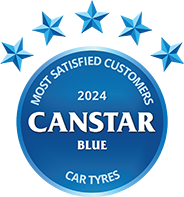Our review compares car tyres on customer satisfaction, so you can find out what other Aussies think about the compared brands before you go ahead with a purchase. Think of it as like asking hundreds of your closest mates which car tyres they think are best!
Canstar Blue surveyed 768 Australians for their feedback on the new car tyres they have purchased in the last two years.
The winning brand is the one that receives the highest overall satisfaction rating once all the scores from the overall satisfaction criteria are combined and averaged.
Find more detailed information on our Most Satisfied Customer methodology.
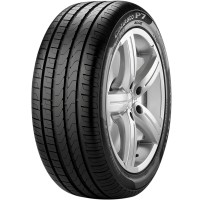
Pirelli received five stars for dry weather handling, value for money, wet weather handling, durability, noise whilst driving, stopping ability and overall satisfaction.
Pirelli was founded in Milan in 1872, and now has a presence in over 160 countries. Pirelli has a range of tyres suitable for summer, winter and all-season as well as for supercars, classic cars and passenger vehicles.
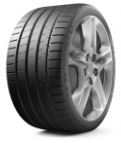
Michelin scored four stars for noise whilst driving and overall satisfaction, as well as three stars for dry weather handling, value for money, wet weather handling, durability and stopping ability.
Michelin was established in Australia in 1997, just over 100 years since its founding in France. Its range includes its Pilot, Energy, Agilis and Diamaris models.
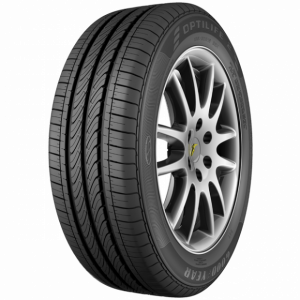
Goodyear received five stars for durability, four stars for value for money, wet weather handling, noise whilst driving, stopping ability and overall satisfaction. The brand also scored three stars for dry weather handling.
Goodyear was founded at the end of the 19th century in Ohio, USA. The brand sells tyres with a range of features including all terrain, braking performance, durability and traction.
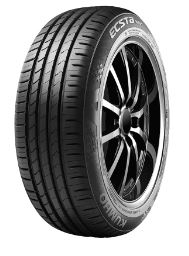
Kumho was rated five stars for value for money and four stars for dry weather handling, durability, stopping ability and overall satisfaction. The brand also received three stars for wet weather handling and noise whilst driving.
Kumho arrived in Australia from South Korea over 40 years ago. The brand sells tyres for a variety of vehicles including trucks, buses, racing cars, 4X4s and other passenger vehicles.
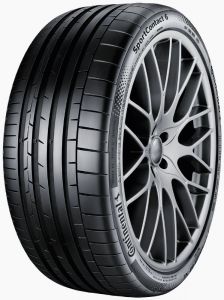
Continental received five stars for noise whilst driving and four stars for dry weather handling, value for money, wet weather handling, stopping ability and overall satisfaction.The brand also scored three stars for durability.
Continental has been making tyres for over 150 years and is available across the country via suppliers and Continental stores. The brand makes tyres for passenger cars, SUVs and 4X4s, as well as vans and campers.
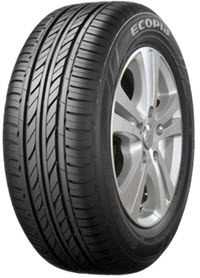
Bridgestone was rated four stars for noise whilst driving as well as three stars for dry weather handling, value for money, wet weather handling, durability, stopping ability and overall satisfaction.
The Bridgestone Corporation was founded in 1931 in Kurume, Japan, and has since expanded internationally. Bridgestone has a range of tyres including the Potenza, Dueler and Alenza models.
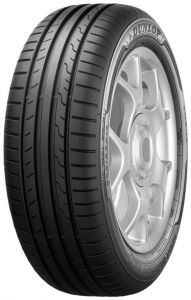
Dunlop was rated four stars for wet weather handling and three stars for dry weather handling, value for money, durability, noise whilst driving, stopping ability and overall satisfaction.
Dunlop’s first factory was opened in Melbourne in 1893. The company has grown to establish over 500 stores across the country, and is also stocked at retailers including Beaurepaires and Goodyear Autocare.
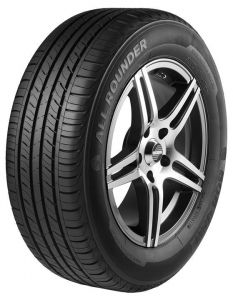
Bob Jane received four stars for wet weather handling and stopping ability, as well as three stars for dry weather handling, value for money, durability, noise whilst driving and overall satisfaction.
The Bob Jane tyre brand stemmed from Bob Jane T-Mart stores; founded by renowned competitive racer, Bob Jane. The brand manufactures the Bob Jane All-Rounder, Bob Jane and Moto Sportx ranges.
Not all brands in the market qualify for our ratings (based on minimum survey sample size), but that doesn’t mean they’re not worth considering. Here are several more brands to check out before making a purchase decision.

This article was written by Canstar Blue Home & Lifestyle Content Producer, Rachel Bollerman. Rachel graduated with a Bachelor of Communications, majoring in Journalism at the Queensland University of Technology. She has worked in a variety of public relations, marketing and communications roles, gaining experience in community management, social media marketing, blog writing and other styles of copywriting. When she’s not working, Rachel enjoys doing arts and crafts projects at home and spending time with friends.

Samantha Howse is Canstar Blue’s Consumer Research Specialist, coordinating the consumer research program behind our customer satisfaction awards across Canstar and Canstar Blue in Australia and New Zealand. Sam has earned a Bachelor of Business (Marketing) from Griffith University and, with seven years in market research and 2 years in marketing, she is experienced in survey design, implementation and analysis, coupled with an understanding of marketing principles and best practice.
Here are the past winners from Canstar Blue’s car tyre ratings:
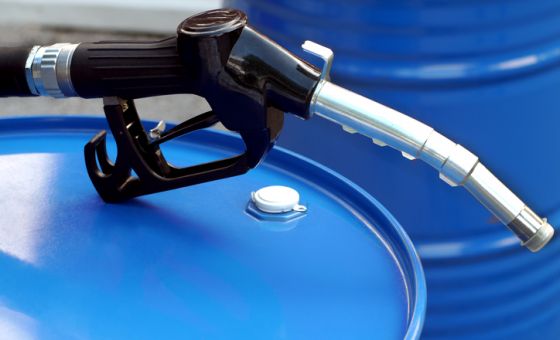
4WD Reviews Australia - April 6th
Petrol comes in E10, E85, 91, 95 and 98 Octane blends. Most cars can get by with E10 or 91, but some cars need higher. Find out which fuel your car needs at Canstar Blue.
– Read more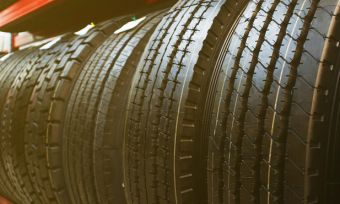
4WD Reviews Australia - March 15th
What are the cheapest car tyres you can buy? Is buying cheap tyres a good idea? Find out everything you need to know at Canstar Blue.
– Read more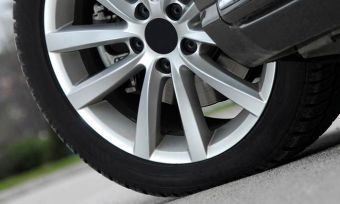
Best-Rated Car Servicing Chain Brand - April 20th
They are two iconic car tyre brands, but which one comes out on top? Read our review of Bob Jane and Goodyear at Canstar Blue.
– Read more
Best-Rated Car Servicing Chain Brand - March 23rd
Two tyre heavyweights battle for supremacy. Which manufacturer reigns supreme? Find out at Canstar Blue.
– Read more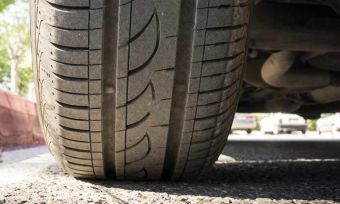
4WD Reviews Australia - March 20th
Michelin and Bridgestone are both kings of the racing circuit, but which is the best on our city roads? Find out at Canstar Blue.
– Read more^By clicking on a shop online, compare now, buy online, more details or check latest prices button, you may leave Canstar Blue and be taken to a referral partner to compare. Canstar Blue may be paid for this referral. You agree that Canstar Blue’s terms and conditions apply to this referral. If you click on a brand that is not a referral partner, you will be taken to a brand page on Canstar Blue.
Canstar Blue may earn a fee for referrals from its website tables, and from sponsorship of certain products. Fees payable by product providers for referrals and sponsorship may vary between providers. Generally, sponsorship fees are payable in addition to referral fees. Sponsored products are clearly disclosed as such on website pages. They may appear in a number of areas of the website such as in comparison tables, on hub pages and in articles. Sponsored products may be displayed in a fixed position in a table, regardless of the product's rating, price or other attributes. The table position of a Sponsored product does not indicate any ranking or rating by Canstar. The table position of a Sponsored product does not change when a consumer changes the sort order of the table. For more information please see How Are We Funded. Payment of fees for ads does not influence our Star Ratings or Awards.
*Prices correct as of publication date.
